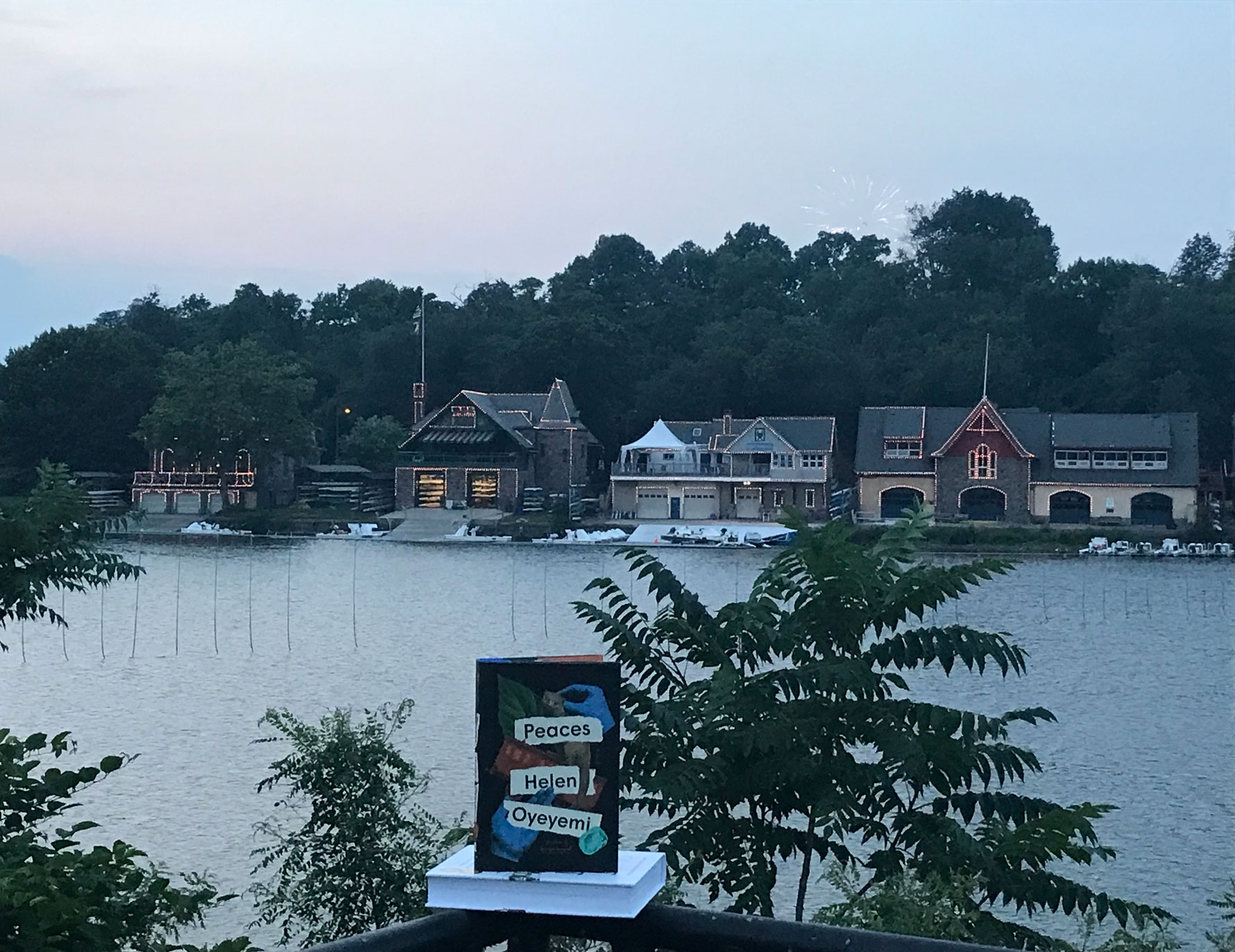Andrew Womack: This week at Camp ToB we're discussing the conclusion of Helen Oyeyemi's Peaces, where we understand—more or less—the concept of "unseeing" and how Ava Kapoor, the proprietor of The Lucky Day, the train that serves as the story's setting, has the ability to "unsee" people, at which point they seem to enter a sort of alternate reality that's invisible to some (but not all?) people. We also discover that Yuri, who's something of an expert as to the ins and outs of "unseeing," was also, at separate times, dating each of our protagonists, Otto and Xavier, who at the end of the novel become "unseen," and seem quite OK with all that, although apparently as part of that sentence they're also banned from Instagram, but perhaps not the "metaverse," I guess.
Joining us as our Activity Reader this week is Jim Davy. Jim, please introduce yourself to Camp!
Jim Davy: Hi! I am a non-profit (mostly) civil rights lawyer who lives in Philadelphia. I say mostly because I generally represent prisoners and other people affected by the criminal justice system, but also do some work on gun safety, privacy, public benefits access, and other topics. Because of my job, I read almost exclusively fiction. I have been a reader forever—I'm the only person in my family with glasses, I think in part because of many years of reading under the covers by flashlight—and discovered the ToB in 2013.
Andrew: Hahha. Well thank you so much for joining us this week. So, the end of this book. The "unseeing," the Instagram bans, what do you make of it?
Jim: I really don't know! This was not my first Oyeyemi—I really enjoyed Mr. Fox—so I anticipated that I might encounter heightened tension without fully understanding all of the plot elements.
Andrew: This was my first Oyeyemi. And I'm relieved I have a companion in my confusion! But go on!
Jim: I think I ended up with too many unanswered questions about the internal universe rules, which undermined my ability to stay immersed.
Andrew: Seriously, yes.
Jim: For instance, even assuming that Ava Kapoor herself has an uncanny power to "unsee" people, why does it not extend to anyone around her but does extend to a social media platform? When Xavier and Otto get off the train, other than an enforced healthier(?) relationship with Instagram, how will their lives differ on a day-to-day basis as a result of Ava's shadow ban? How common is this such that Yuri would allude to support groups, and, if it's at all common, why is it so impossible for other people to imagine this might be a real thing that happens? Why do we not have a whole separate novel about what happens to Xavier's aunt during the course of their time on The Lucky Day?

Andrew: Only if it's a comedy of manners with no magical realism! I mean, I'm kidding. Though to match the contradictory nature of this novel, I'm also serious.
Still, I do want to go deeper on what you mention about the mechanics of this universe. Because by the end I strongly suspected there weren't any. Based on last week's discussions, we're all on board that this is a beautifully rendered novel. But plot-wise, does it all add up? I don't think so. Was the second half satisfying for you, as a reader?
Jim: The second half of the book never answered questions I had built over time—and while it's not fair to expect answers, necessarily, I couldn't quite get over that.
Andrew: I don't know. I think it's OK to demand at least a few answers out of a novel. It's a two-way street. So what were some of your questions?
Jim: If Ava is the only person who can't see Přem, and consequently acts in a way that makes her seem like an enormous asshole at all times, why is the will structured the way that it is?
Andrew: Why, indeed. But at least it was an answer as to why she seemed to be an enormous asshole! There's an answer. What else?
Jim: Why did everyone in the friend group that included both of them just… accept that, and coddle her accordingly? What is the deal with the rules as applied to the art? Again, it's not necessarily fair for me to expect answers to these questions, but I feel like a big difference between Peaces and past ToB books like e.g. Fever Dream or Piranesi that required readers to suspend a little bit of disbelief and embrace some magical realism is that those books either provided fewer details to become inconsistent and trip you up, or built the castle more meticulously and slowly unfurled the answers for you.
Andrew: Agreed. You know, putting the entire novel into perspective, I'm around 80 percent dissatisfied with it, and the 20 percent that I can't fault in any way was the style. The writing. The nuances and tangents of the storytelling. That was all extraordinary.
Jim: I agree, absolutely. One of the things I did legitimately love about this book were the random asides that hinted at entire other stories. The bazaar! Mr. Lin's business and whole deal! (As I said, I mostly represent prisoners, and the scene in the visitation room with Laura and his employment offer-slash-hard sell captivated me.) The train itself having medium Night Circus transport train energy! Spera the eccentric artist! The novel about the harpsichord that I would absolutely read!
Andrew: Though brief, the bazaar chapter is a prime example of the lovely way this story is told, with these tangential, novels-in-miniature—that still go nowhere, but hint at untold stories. Like how it begins:
The bazaar was a faraway land I walked aeons to reach. Through the pantry car and the shower car and the postal-sorting carriage and the picture gallery car. The self-portrait of Přem ignored me, and the ground seemed to lick at my feet until I let that conveyor-belt sensation propel me into the dormitory car, with its many rows of bunk beds, each mattress a lily-white altar to innocence or incarceration.
And then later:
Moving from stall to stall I sipped tea, watched a snail race, became referee of the snail race and arbitrated a doping scandal, sipped vodka, sipped tea laced with vodka, kept forgetting I don't have a chequebook.
I had similar feelings about these unrewarded tangents in the first half, with the whole story about Árpád's history and the vipers in the child's bedroom. I think we can say this novel paints a rich world—but let's ask ourselves: Is there anything behind the canvas?
Jim: Perhaps there is, but we have both unseen it.
Andrew: Nice.
Peaces by Helen Oyeyemi
When Otto and Xavier Shin declare their love, an aunt gifts them a trip on a sleeper train to mark their new commitment—and to get them out of her house. Setting off with their pet mongoose, Otto and Xavier arrive at their sleepy local train station, but quickly deduce that The Lucky Day is no ordinary locomotive. Their trip on this former tea-smuggling train has been curated beyond their wildest imaginations, complete with mysterious and welcoming touches, like ingredients for their favorite breakfast. They seem to be the only people onboard, until Otto discovers a secretive woman who issues a surprising message. As further clues and questions pile up, and the trip upends everything they thought they knew, Otto and Xavier begin to see connections to their own pasts, connections that now bind them together.
Book description excerpted from publisher's summary and edited for length.
Jim: More seriously: I don't know if her boundless imagination and style made up for the non-answers, at least for me. Especially when it comes to the central conceit of the novel. The idea of "unseeing"—of having someone so… frustrated, upset, mad, something(?), that they erase you from at least their own experience of the universe—is unsettling. But I remain pretty unclear about how it works.
That confusion aside, the idea of unseeing did make me think about seeing/being seen. For me, it highlighted how one really should try not to obsess over people who just refuse to treat you like a human when you're otherwise surrounded by loving family and friends. Like Přem—so many people in his life clearly adored him, why did he need so deeply to corral Ava's attention? And there's a huge difference between people who see you clearly and then not at all, and Ava barely knowing Xavier and Otto prior to the events of their not-a-honeymoon. What are the stakes of being unseen in those circumstances? Not exactly the mortifying ordeal of being known, and then the much more mortifying ordeal of rejection.
Andrew: I felt like there was such potential for this idea of "unseeing," but it never actually landed for me. How does it work? What are its implications? A similar kind of effect that I thought worked quite well was the "White Christmas" episode of Black Mirror, where people can "block" one another, rendering them as silent silhouettes. That's the more morbid version of "unseeing"—which for our Peaces protagonists is something of a happy ending—but I agree, the "unseeing" was more thematic here. How it connected to the larger plot wasn't entirely apparent, at least to me.
Jim: I have never seen that! The other thing that it made me think about a lot was actually Hadestown, the soundtrack to which I was listening to on loop around the time I was reading Peaces. I don't feel bad spoiling a Greek myth—I think we're outside the statute of limitations on that—but after Eurydice ends up in hell, Orpheus goes down to rescue her; Hades allows him to try to lead her out on foot, but if he looks back at her anytime during the walk to confirm that she's there, she's doomed to remain in hell forever. And of course, after a long walk to freedom, right at the end, he looks back. In some ways a reverse of the unseeing here.
Andrew: I actually had a similar feeling! It felt like a curse, perhaps, some kind of arrangement with strings attached. But please, continue.
Jim: Mostly the simultaneous consumption just made me think about the relationship between literally and metaphorically seeing someone. Orpheus knows Eurydice quite well, although at the key moment he doubts his ability to have metaphorically "seen" her, so literally looks back at her. In Peaces, that's much more ambiguous. Ava in some ways "sees" Přem very well—she can get him to sleep when nobody else can!—but in other ways the people she unsees are people she maybe never really "saw" or cared to know at all.
But again, because the book hints that the unseeing is a semi-common phenomenon in the universe of the story, but provides no other examples or context, it's hard to really know for sure.
Andrew: Something I have to say I did love about the book was how much anticipation I had between where we left off last week—with so many questions unanswered, so many threads untied—and this week—which to me made the first half of the book feel like a very imperfectly built house of cards—is that it fits into the very conceit of the book, where you can't trust what you see, or how what you see may be something else entirely. However unsatisfying it was for me, that dissatisfaction felt like it played right into what the book means. Does that ring true for you?
Jim: It definitely feels like a true description of how I experienced the book! But as I mentioned, I think you have to be able to trust something in what you're reading. Even if not the characters' dialogue, occasional narration. Even if not an unreliable narrator, a set of in-universe rules. If not those, it gets a lot harder.
Andrew: Coming out of the first half of the book, I became comfortable enough with the idea that this is a book that doesn't play by the rules, and doesn't set any for itself. But what's the result of that? For me, it's that I never became invested in any of the characters.
Jim: Maybe it's a personal failing that I at least need to feel like I understand what's going on—at least on the book's own terms, as you say—to really enjoy something. (Personal failing either for having that trait, or for not understanding here!) But the result for me was that the climax just didn't feel like it had any stakes. Otto and Xavier are unseen, by a person they will probably never encounter again. (Although also, the web of intersecting connections between all the mentioned people maybe means that they might? Not clear!) So what? How does that affect their future in any substantial way?
If you could have had answers to any questions, what would those questions have been? Or, put another way, what could have been different that would have left you less dissatisfied overall?
Andrew: Good question, and one I'm going to bounce right back to you once I've answered. I think what I needed was even a single fixed point of reality, and by that I mean some character in all this who's playing it straight. A character who acts as a conduit to our world. Something this novel does especially well is that it takes our reality, the reality of social media and Dawson's Creek and Friends, and bends it. Which is all so perfectly surreal. But I wanted an advocate (and I expected it to be Otto), yet I never got that. I believe the novel did out what it set out to do—to leave the reader untethered—and it's very successful in this regard. But as a reader, I needed a lifeline.
What about you? What would have increased your satisfaction?
Jim: As I've alluded to, I think that I would have enjoyed it more if the book had leaned harder in one direction or the other: either providing enough information that I would have understood and felt the stakes of becoming unseen, or providing less information such that I would not have been as distracted from the beautiful style and writing while I was searching for answers that never came. I think that a single fixed point of reality, as you put it, would be one way of accomplishing the first thing. But I think either might have worked better (for me!).
Andrew: So there we are. A confounding book, and whether that's a good or bad thing will be up to our readers, ultimately. Thank you, Jim, and everyone, please join us next week for the first half of our final—what—novel of the summer, Rivka Galchen's Everyone Knows Your Mother Is a Witch.
The Camp ToB 2021 Calendar
- June 2: No One Is Talking About This through part one
- June 9: No One Is Talking About This to the end
- June 16: Detransition, Baby through chapter four
- June 23: Detransition, Baby to the end
- June 30: Klara and the Sun through part three
- July 7: VACATION
- July 14: Klara and the Sun to the end
- July 21: Whereabouts through "At the Cash Register"
- July 28: Whereabouts to the end
- Aug. 4: Peaces through chapter eight
- Aug. 11: Peaces to the end
- Aug. 18: Everyone Knows Your Mother Is a Witch through page 137
- Aug. 25: Everyone Knows Your Mother Is a Witch to the end
- Sept. 1: Announce summer champion
You can find all our summer titles at our Camp ToB 2021 Bookshop list.



